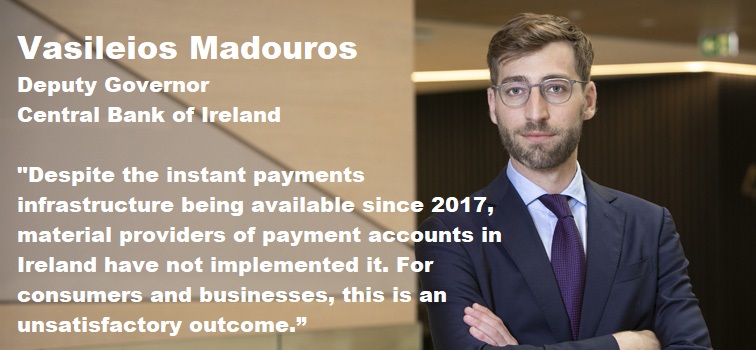
Ireland’s retail payments landscape is lagging behind other parts of Europe in some areas, „which is unsatisfactory for consumers and businesses”. The Central Bank of Ireland has outlined a new multi-year payments strategy amid concerns that banks are failing to grasp the opportunities presented by instant payments.
Speaking at the BPFI National Payments Conference, Vasileios Madouros – Deputy Governor, Central Bank of Ireland said, “Since the last National Payments Plan, a little over a decade ago, there has been remarkable change and innovation in domestic payments. But there are also important areas where Ireland is still lagging behind. Consumers having greater access to payment solutions is dependent on the market grasping the opportunities available. Despite the instant payments infrastructure being available since 2017, material providers of payment accounts in Ireland have not implemented it. For consumers and businesses, this is an unsatisfactory outcome.”
Deputy Governor Madouros continued – “Ireland is host to a growing and innovative payments sector. Ireland is also the base of a very innovative technology sector. And people have shown they are willing, and eager, to embrace new technology in payments. Yet many of the benefits of technology in relation to payments for domestic consumers and the broader economy remain untapped. The development of the National Payments Strategy by the Department of Finance offers an opportunity to change that and we, in the Central Bank of Ireland, look forward to playing our part.”
Today, the Central Bank of Ireland also published its recommendations in response to the public consultation on the Department of Finance’s National Payments Strategy. The Central Bank has proposed four high-level priorities through to end 2030:
Priority 1: Coordinated Action to Realise the Benefits of Innovation and Integration in a European Context
Material payment account operators shall ensure that Irish consumers and small businesses benefit from payment innovations that exist elsewhere in Europe. Emerging payment solutions shall be integrated with Europe and interoperable with other key markets, where possible.
Priority 2: Safeguarding Cash as a Means of Payment
Cash should remain widely available and accepted as a means of payment, and this choice should be safeguarded for consumers and businesses.
Priority 3: Maintaining Security and Resilience in Payments
Issuers, operators, participants, and enabling network providers engage collectively to ensure the security and resilience of the payments ecosystem.
Priority 4: Enhancing Research and Analytical Insights
National public authorities, industry associations, and research bodies shall enhance capacity for better informed policy decisions on payments, through research and analytical insights.
Concluding, DG Madouros said, “The National Payments Strategy offers an opportunity to take a longer-term view and develop a coherent, system-wide approach to the future evolution of payments in Ireland, within a European context. Like any societal transition, the technology-driven evolution in the payments landscape needs to be managed carefully from a public policy perspective. Making the most of that opportunity will be critical. Because a healthy and competitive economy relies on an innovative, inclusive and resilient payments ecosystem.”
Banking 4.0 – „how was the experience for you”
„To be honest I think that Sinaia, your conference, is much better then Davos.”
Many more interesting quotes in the video below: